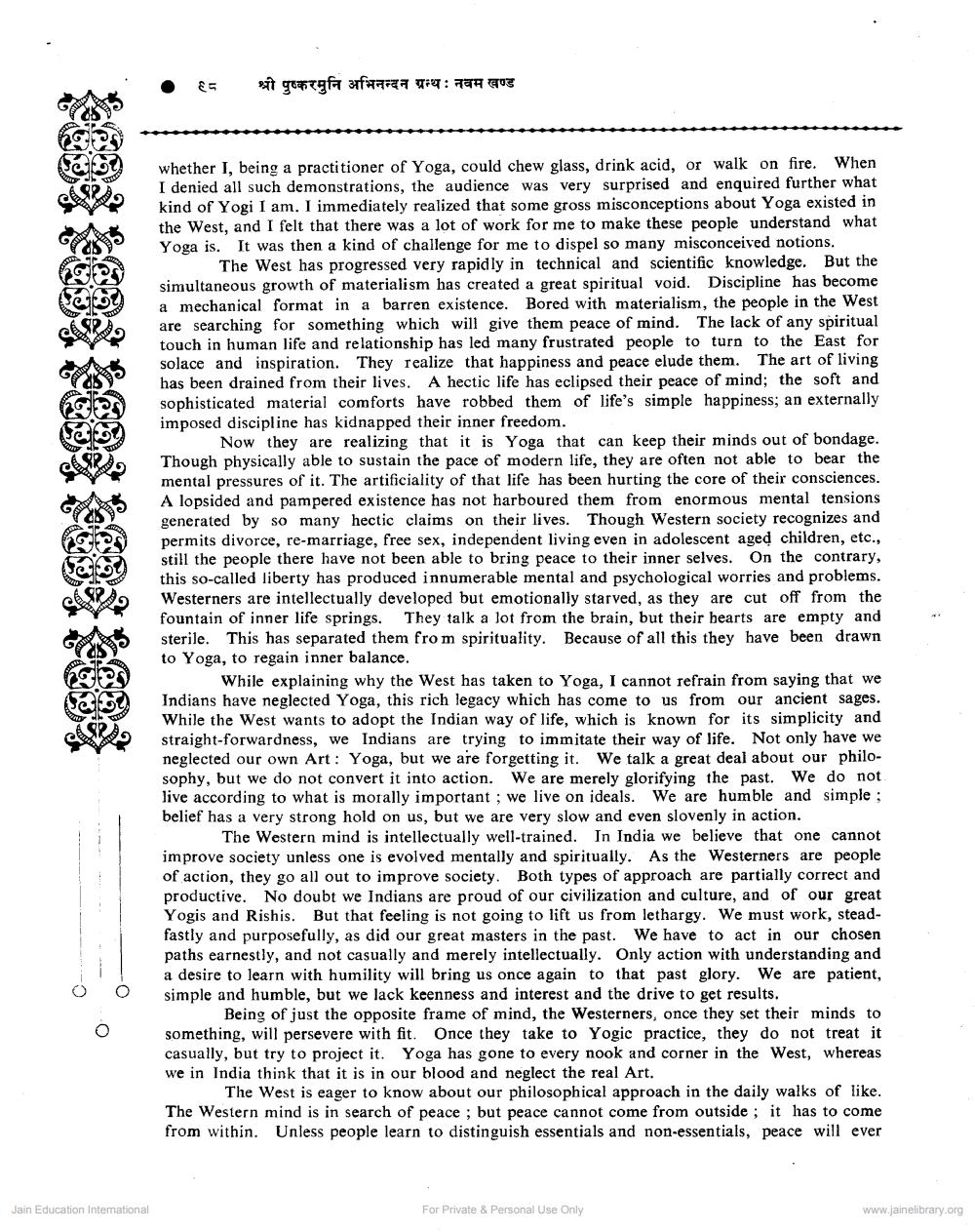Book Title: Why is the West Interested in Yoga Author(s): B K S Iyengar Publisher: Z_Pushkarmuni_Abhinandan_Granth_012012.pdf View full book textPage 2
________________ ६८ श्री पुष्करमुनि अभिनन्दन ग्रन्थ : नवम खण्ड . whether I, being a practitioner of Yoga, could chew glass, drink acid, or walk on fire. When I denied all such demonstrations, the audience was very surprised and enquired further what kind of Yogi I am. I immediately realized that some gross misconceptions about Yoga existed in the West, and I felt that there was a lot of work for me to make these people understand what Yoga is. It was then a kind of challenge for me to dispel so many misconceived notions. The West has progressed very rapidly in technical and scientific knowledge. But the simultaneous growth of materialism has created a great spiritual void. Discipline has become a mechanical format in a barren existence. Bored with materialism, the people in the West are searching for something which will give them peace of mind. The lack of any spiritual touch in human life and relationship has led many frustrated people to turn to the East for solace and inspiration. They realize that happiness and peace elude them. The art of living has been drained from their lives. A hectic life has eclipsed their peace of mind; the soft and sophisticated material comforts have robbed them of life's simple happiness; an externally imposed discipline has kidnapped their inner freedom. Now they are realizing that it is Yoga that can keep their minds out of bondage. Though physically able to sustain the pace of modern life, they are often not able to bear the mental pressures of it. The artificiality of that life has been hurting the core of their consciences. A lopsided and pampered existence has not harboured them from enormous mental tensions generated by so many hectic claims on their lives. Though Western society recognizes and permits divorce, re-marriage, free sex, independent living even in adolescent aged children, etc., still the people there have not been able to bring peace to their inner selves. On the contrary, this so-called liberty has produced innumerable mental and psychological worries and problems. Westerners are intellectually developed but emotionally starved, as they are cut off from the fountain of inner life springs. They talk a lot from the brain, but their hearts are empty and sterile. This has separated them from spirituality. Because of all this they have been drawn to Yoga, to regain inner balance. While explaining why the West has taken to Yoga, I cannot refrain from saying that we Indians have neglected Yoga, this rich legacy which has come to us from our ancient sages. While the West wants to adopt the Indian way of life, which is known for its simplicity and straight-forwardness, we Indians are trying to immitate their way of life. Not only have we neglected our own Art: Yoga, but we are forgetting it. We talk a great deal about our philosophy, but we do not convert it into action. We are merely glorifying the past. We do not live according to what is morally important; we live on ideals. We are humble and simple : belief has a very strong hold on us, but we are very slow and even slovenly in action. The Western mind is intellectually well-trained. In India we believe that one cannot improve society unless one is evolved mentally and spiritually. As the Westerners are people of action, they go all out to improve society. Both types of approach are partially correct and productive. No doubt we Indians are proud of our civilization and culture, and of our great Yogis and Rishis. But that feeling is not going to lift us from lethargy. We must work, steadfastly and purposefully, as did our great masters in the past. We have to act in our chosen paths earnestly, and not casually and merely intellectually. Only action with understanding and a desire to learn with humility will bring us once again to that past glory. We are patient, simple and humble, but we lack keenness and interest and the drive to get results. Being of just the opposite frame of mind, the Westerners, once they set their minds to something, will persevere with fit. Once they take to Yogic practice, they do not treat it casually, but try to project it. Yoga has gone to every nook and corner in the West, whereas we in India think that it is in our blood and neglect the real Art The West is eager to know about our philosophical approach in the daily walks of like. The Western mind is in search of peace; but peace cannot come from outside ; it has to come from within. Unless people learn to distinguish essentials and non-essentials, peace will ever Jain Education International For Private & Personal Use Only www.jainelibrary.orgPage Navigation
1 2 3
